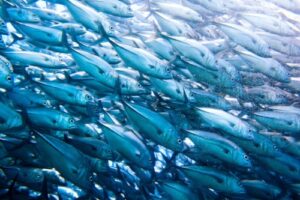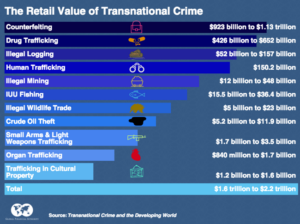
Natural Resources
Why are natural resources at risk of illicit financial flows?
Countries rich in natural sources and highly dependent on them to fund their national economies tend to statistically have deeply entrenched issues of illicit financial flows (IFFs) and corruption.
In discussing the vulnerabilities of natural resources to IFF risks, the focus tends to be on the oil and mining sector. However, the illegal trade in fish, wildlife and timber are equally important and lucrative for illicit activity. For example, Global Financial Integrity’s (GFI) 2017 report ‘Transnational Crime and the Developing World’ found that the annual global retail value of illegal logging and the illegal wildlife trade were respectively in the range of US$52 billion to US$157 billion and US$5 billion to US$23 billion.
The illegal trade in wildlife, fish and timber can have devastating, long-term consequences for countries. Wildlife trafficking has been linked to the spread of disease in human populations with profound implications for human health, including Covid-19. Moreover, it places vulnerable species at risk for becoming endangered or extinct. Illegal logging causes significant environmental damage, contributing to deforestation and soil erosion, while illegal fishing depletes fish stocks and constrains local livelihoods. Moreover, the illicit trade in natural resources is also exploited by networks of transnational criminals who use the illicitly derived proceeds to finance armed conflict, control territories and loot the natural resource wealth of a country.
What makes natural resources susceptible to IFF risks?
- The natural resource sector tends to come under high levels of discretionary political control, which can facilitate IFFs. The secretive nature of operations generates income streams that allow political elites to consolidate revenue and remain independent of external donors and accountability measures.
- Economic interests between the government, shareholders and the private sector remain blurred. Politically-exposed persons (PEPs) tend to have vested interests in the sector and along the supply chain. Contracts are not always awarded openly, and their terms are often shrouded in secrecy. This provides opportunities for collusion and bribes and encourages a system of patronage.
- Competition is limited in many countries where natural resources are under the control of state companies. Even when private sector companies are involved, the financial, technical and operational complexity excludes many participants.
- The extractives sector is particularly technical and complex and requires a high degree of expertise. Therefore, monitoring and understanding the corporate networks, contractual arrangements and tax implications can be difficult for external donors, civil society organizations and the public to navigate.
- Finally, resource rich countries are well integrated into the global economy, but only through limited channels, due to their resource dependence. This makes that are already under-regulated and not subject to international money laundering regimes easy and lucrative avenues for exploitation.
At what stages does it occur?
IFF risks occur through every step of the value chain:
How is the financial and trade system utilized?
IFF risks in the natural resources sector span both the financial and trade systems. On the financial side, complex corporate ownership structures, anonymous companies and sheltering money in tax havens are utilized to structure and hide illicit proceeds. On the trade side, illicit actors take advantage of weak controls along the value chain, poor import-export controls, asymmetries in tariff structures within regional trade blocs, inadequate oversight mechanisms in free zones, trade misinvoicing and a lack of information sharing between countries to facilitate the movement of illicit goods and profits.
For more on the intersection of natural resources and trade-based money laundering, watch the following video from the Targeting Natural Resource Corruption Project, featuring GFI’s Channing Mavrellis:
Making the connection: Trade-based money laundering, corruption, and natural resources from TNRC Project on Vimeo.
How does GFI help?
GFI leverages extensive experience on natural resource crime and illicit financial flows in countries around the world. Through technical consultation, research and advocacy on every stage leading up to the sale of the natural resource, it seeks to curb and address IFF risks. GFI’s expertise includes:
Providing comments on mining and minerals legislation
In Uganda, GFI works with partners to advocate for anti-corruption and financial transparency reform in the mining sector. In 2019, GFI and partner ACODE provided comments on Uganda’s draft mining and mineral bill, which would update the 2003 mining law. GFI addressed fair and transparent procurement, contracting and licensing processes, beneficial ownership standards, corporate board governance of Uganda’s state-owned enterprises, and management of risks of politically exposed persons in the mining sector. These changes would fight corruption and improve transparency in the mining sector in order to reduce illicit financial flows.
Sectoral risk assessments modeled in the format of a national risk assessment
Countries carry out national risk assessments (NRAs) on a government-wide basis to assess money laundering and terrorist financing risks. The NRA is used by countries to determine how to best allocate limited resources to address or eliminate IFF risks. GFI employs this methodology, but carries it a step further and conducts a deep-dive assessment into the risks affecting an individual sector through analysis of transaction-level trade data and mapping out the risks, including across the legal framework, payments and transportation methods and jurisdictional risk.
Technical consultation and advocacy for stronger measures on beneficial ownership on both the banking and trade sector
Opaque and secret company ownership structures enable extractive companies to obfuscate corruption, bribery, tax payments, conflicts of interest and PEP relationships. Requiring companies competing for such contracts to disclose and publish beneficial ownership information can go a long way to deterring practices that enable IFFs.
Advocating for stronger trade misinvoicing laws, as well as data tools and trainings to better identify and detect trade misinvoicing
GFI’s research has shown that from 2008-2017 there was an US$8.7 trillion value gap between what developing nations reported as the value of imports and exports with advanced economies, and what their advanced economy trading partners reported importing and exporting. This translates into potentially large losses of trade tax revenue for both developing and advanced economies. Such revenue is critical to enhancing domestic resource mobilization and any hope of achieving the 2030 Sustainable Development Goals.
Creating comprehensive policy measures to counter trade-based money laundering
Trade-based money laundering (TBML) is the process of disguising the proceeds of crime and moving value through the use of trade transactions in an attempt to legitimize their illicit origins. The enormous volumes of trade flows can conceal individual transactions and easily facilitate the laundering of natural resource crime proceeds. GFI helps provide red flag indicators, typologies, as well as regulatory recommendations to governments and other stakeholders to curb natural resource related TBML.
Mapping and identifying IFF vulnerabilities in supply chains
Supply chains pose serious risks for money laundering, corruption and IFFs. Global commodities move through a vast network of corporate structures and company ownership. The complexity and very often informal nature of the supply chain makes it difficult to identify and pinpoint exactly the illicit activity. Mapping the chain for a particular sector and identifying its vulnerabilities allows governments to address those risks through innovative policy mechanisms and focused law enforcement efforts.
Mapping risks of free trade zone
Free zones carry a special status within countries as “areas where certain administrative and oversight procedures are reduced or eliminated in order to boost economic growth through trade.” This makes them especially vulnerable to IFF risks. GFI identifies risks to free zones and promotes policy recommendations to mitigate against weak enforcement mechanisms in its work.
Assessing the gaps in commodity trading practices
Global commodity markets are valued in the trillions of dollars. It is estimated that 59 percent of all metals and ores, 63 percent of all coal and 64 percent of all oil originates from developing countries. For developing countries to truly benefit from their resources, both producing countries and commodity trading hubs in advanced economies must address IFF vulnerabilities. GFI advocates for policy changes at the international level and also provides best practices that both producing countries and commodity trading hubs can adopt.
Assembling a weekly digest for subscribers of the latest news in natural resource crime.
Readers can subscribe here to receive a weekly digest of the latest news in natural resource crime, curated from reliable news sources.
Related Reports and Publications:
The Illicit Gold Trade in Colombia (2020, Forthcoming)
The Illicit Gold Trade in Uganda (2020, Forthcoming)
The Illicit Timber Trade in Colombia (2020, Forthcoming)
Illicit Financial Flows and the Illegal Trade in Great Apes, 2018
The Serious Impacts of Fisheries Crime, 2018


